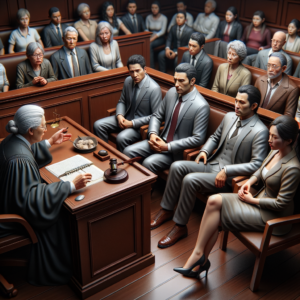Unprecedented Federal Court Rulings: A Turning Point in Justice
In recent months, the United States federal court system has witnessed a series of unprecedented rulings that have sparked widespread debate and concern among legal scholars, civil rights advocates, and the general public. These decisions, which have challenged long-standing legal precedents and reshaped the landscape of American jurisprudence, signal a turning point in the quest for justice. As the nation grapples with these developments, it is crucial to understand the context, key cases, implications, and public responses surrounding these rulings.
Understanding the Context: The Rise of Unprecedented Federal Court Rulings
The past few years have seen a significant shift in the federal judiciary, characterized by a surge in rulings that diverge from traditional interpretations of the law. This trend can be traced back to a combination of factors, including the appointment of judges with distinct ideological leanings and the increasing polarization of the political landscape. As cases involving contentious issues such as immigration, healthcare, and civil rights have made their way through the courts, federal judges have often found themselves at the center of heated national debates. The rise of social media and the 24-hour news cycle has further amplified the visibility of these rulings, leading to a heightened public interest in the judiciary's role in shaping policy and protecting individual rights.
Key Cases That Shaped Recent Federal Court Decisions in the Justice System
Several landmark cases have emerged as pivotal moments in the recent evolution of federal court rulings. One notable example is the case of Dobbs v. Jackson Women’s Health Organization, where the Supreme Court overturned Roe v. Wade, fundamentally altering the legal landscape surrounding reproductive rights in the United States. Another significant case is Bostock v. Clayton County, which expanded the interpretation of Title VII of the Civil Rights Act to include protections against discrimination based on sexual orientation and gender identity. These cases, among others, have not only redefined legal precedents but have also ignited passionate discussions about the balance between individual liberties and state interests, making them crucial to understanding the current judicial climate.
Analyzing the Implications of Recent Rulings on Civil Rights and Liberties
The implications of these unprecedented federal court rulings extend far beyond the courtroom, influencing the lives of millions of Americans. The rollback of established rights, particularly in cases like Dobbs, has raised concerns about the erosion of personal freedoms and the potential for further restrictions on civil liberties. Conversely, rulings that expand protections, such as those seen in Bostock, highlight the judiciary's role in advancing social justice. As courts continue to grapple with complex issues surrounding race, gender, and sexuality, the outcomes of these cases will likely have lasting effects on the legal framework that governs civil rights in the United States, prompting advocates to reassess their strategies and objectives in the fight for equality.
The Role of Judicial Activism in Shaping Contemporary Legal Precedents
Judicial activism has emerged as a contentious topic in discussions surrounding recent federal court rulings. Proponents argue that an active judiciary is essential for addressing social injustices and adapting the law to contemporary societal values. Critics, however, contend that such activism undermines the principle of separation of powers and leads to judicial overreach. The recent rulings have reignited this debate, as judges are increasingly called upon to interpret laws in ways that reflect evolving societal norms. This tension raises important questions about the role of the judiciary in a democratic society and the extent to which judges should influence public policy through their decisions.
Public Response: How Citizens and Organizations Are Reacting to Court Decisions
The public response to recent federal court rulings has been marked by a mixture of outrage, support, and mobilization. Advocacy groups, civil rights organizations, and grassroots movements have rallied in response to decisions perceived as regressive, organizing protests, lobbying efforts, and educational campaigns to raise awareness about the implications of these rulings. Conversely, some segments of the population have celebrated these decisions as victories for conservative values and a return to traditional interpretations of the law. The polarized reactions underscore the deep divisions within American society regarding issues of justice, rights, and the role of the judiciary, highlighting the urgent need for dialogue and understanding in an increasingly fragmented political landscape.
Looking Ahead: The Future of Justice in Light of Recent Federal Court Rulings
As the dust settles on these unprecedented federal court rulings, the future of justice in the United States remains uncertain. Legal experts predict that the ramifications of these decisions will continue to unfold, influencing not only future court cases but also legislative agendas at both state and federal levels. The judiciary's evolving role in addressing contemporary issues will likely prompt further scrutiny and debate, as citizens and lawmakers alike grapple with the balance between judicial independence and accountability. In this dynamic environment, the ongoing dialogue surrounding civil rights, judicial activism, and the rule of law will be critical in shaping the trajectory of justice in America for years to come.
In conclusion, the recent wave of unprecedented federal court rulings marks a significant turning point in the American justice system. As the nation navigates the complexities of these decisions, it is essential to remain vigilant and engaged in discussions about their implications for civil rights and liberties. The evolving landscape of the judiciary will undoubtedly continue to influence the fabric of American society, making it imperative for citizens, advocates, and lawmakers to actively participate in shaping the future of justice in the United States.
